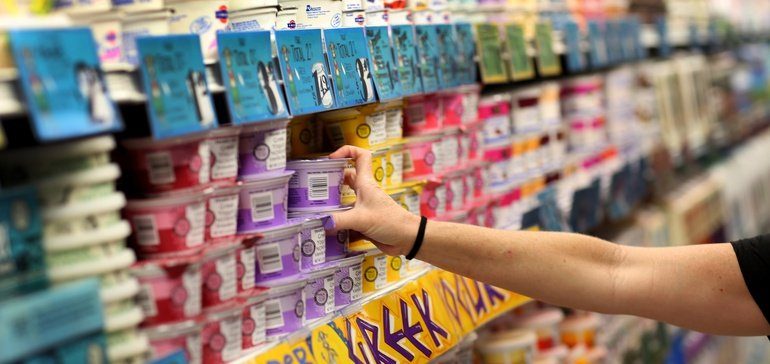Taste is tops in consumers’ yogurt priorities, survey finds

Dive Brief:
- Nearly half of consumers (48%) consider taste a top reason for eating yogurt, according to new research from the International Food Information Council (IFIC). Health benefits (38%) and nutritional value (37%) round out the top three.
- Consumers who eat yogurt for its health benefits do so for general health and wellness (70%) and digestive/gut health (60%). Consumers who eat yogurt for its nutritional value prioritize protein (39%) and calcium content (31%). Nearly one out of four shoppers seek yogurt with “natural” claims, with one in five looking for low-fat claims.
- Shoppers who buy dairy yogurt are more likely than those who buy plant-based to prioritize low/reduced sugar, according to the IFIC survey. Plant-based consumers are more likely to prioritize natural and high protein claims. All yogurt shoppers are facing option overload, as manufacturers introduce a flurry of both dairy- and plant-based options with different claims and qualities, to stand apart in the cooler.
Dive Insight:
Half of consumers consider the Nutrition Facts panel and list of ingredients important when shopping for yogurt, according to IFIC’s survey. This shows how engaged these shoppers are — and it has stepped up pressure on yogurt makers to reformulate their products and make functional ingredient or health claims a central focus of their branding.
Sugar content has been a concern and interest area for many shoppers, particularly after the Food and Drug Administration required manufacturers to list added sugars on the Nutrition Facts label. A number of yogurt manufacturers have responded by introducing yogurts that have low- or no sugar content — often in combination with a protein boost.
In April, General Mills introduced a high-protein yogurt to its keto-friendly Ratio product line that contains 25 grams of protein and 3 grams of sugar. It joins the original line of Ratio yogurts, which contain 15 grams of protein and 1 gram of sugar per serving. Icelandic yogurt maker Siggi’s also emphasizes the low-sugar, high-protein content of its clean label yogurts, and Noosa offers the HiLo line, which has 12 grams of protein and 12 grams of sugar per 5.3-ounce cup.
Danone has focused its yogurt brands on specific health and wellness trends. Its Greek yogurt brand Two Good contains only two grams of sugar. The label posted more than $111 million in revenue during its first 16 months on the market, according to Danone. The dairy giant also offers a high-protein option under its Oikos Greek Triple Zero brand with 15 grams of protein and zero added sugars.
Ingredients to support gut health are also becoming a larger focus for yogurt manufacturers. Danone has been a long-standing player in the gut health category through its Activia brand. Chobani recently made a play for the space by launching Chobani Probiotic, a fruity plant-based beverage, and Chobani Complete, lactose-free Greek yogurt food and drinks that have a high protein content and amino acids.
To date, plant-based varieties account for only 2.9% of the overall yogurt segment. However, sales of plant-based yogurt are growing quickly, leaping 20% in 2020 to hit $343 million, according to the Plant Based Foods Association. This has encouraged everal yogurt makers to enter the category. Chobani has been bullish on plant-based yogurt options, introducing a product line made from coconuts called Non-Dairy Chobani in 2019. Siggi’s launched its own plant-based line of Icelandic yogurt later that same year.
As IFIC’s survey reveals, however, functional features and added health benefits alone won’t necessarily win consumers over in the crowded yogurt segment. As manufacturers try to combine more trends into their offerings, they cannot lose sight of flavor.
Source: fooddive.com

